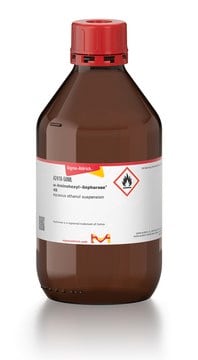P8563
Polyuridylic acid–Agarose
lyophilized powder, matrix polyacrylhydrazido-agarose
Synonym(s):
Poly(U)–Agarose potassium salt
Sign Into View Organizational & Contract Pricing
All Photos(3)
About This Item
Recommended Products
form
lyophilized powder
Quality Level
extent of labeling
0.1-1.0 mg per mL
matrix
polyacrylhydrazido-agarose
matrix attachment
ribose moiety after periodate oxidation
swelling
1 g swells to ~4 mL
capacity
≥0.2 mg/mL binding capacity (poly(A) (P 9403))
storage temp.
−20°C
Application
Polyuridylic acid-agarose is used in protein chromatography, affinity chromatography and specialty resins. Polyuridylic acid has been used to study insulin receptors and to develop polyclonal antibodies against RNase L.
Physical form
Lyophilized powder stabilized with lactose
Storage Class Code
11 - Combustible Solids
WGK
WGK 3
Flash Point(F)
Not applicable
Flash Point(C)
Not applicable
Personal Protective Equipment
dust mask type N95 (US), Eyeshields, Gloves
Certificates of Analysis (COA)
Search for Certificates of Analysis (COA) by entering the products Lot/Batch Number. Lot and Batch Numbers can be found on a product’s label following the words ‘Lot’ or ‘Batch’.
Already Own This Product?
Find documentation for the products that you have recently purchased in the Document Library.
C F Wright et al.
The Journal of biological chemistry, 276(44), 40680-40686 (2001-09-08)
Vaccinia virus gene expression is temporally regulated, and three gene classes have been identified: early, intermediate, and late. Several virus-encoded proteins and an activity designated VLTF-X are required for maximum transcription in vitro of a template containing a late promoter.
Ling Du et al.
RNA (New York, N.Y.), 11(9), 1340-1347 (2005-07-27)
Activity-dependent changes in protein synthesis modify synaptic efficacy. One mechanism that regulates mRNA translation in the synapto-dendritic compartment is cytoplasmic polyadenylation, a process controlled by CPEB, the cytoplasmic polyadenylation element (CPE)-specific RNA binding protein. In neurons, very few mRNAs are
Shijun Cheng et al.
The Journal of biological chemistry, 282(35), 25247-25258 (2007-07-04)
The poly(A)-binding protein (PABP), a protein that contains four conserved RNA recognition motifs (RRM1-4) and a C-terminal domain, is expressed throughout the eukaryotic kingdom and promotes translation through physical and functional interactions with eukaryotic initiation factor (eIF) 4G and eIF4B.
E A Zemskov et al.
Journal of virology, 74(15), 6784-6789 (2000-07-11)
The Bombyx mori nucleopolyhedrovirus (BmNPV) genome contains five related members of the bro gene family, all of which are actively expressed in infected BmN cells. Although their functions are unknown, their amino acid sequences contain a motif found in all
Catherine Berset et al.
RNA (New York, N.Y.), 9(7), 871-880 (2003-06-18)
We identified and mapped RNA-binding sites of yeast Saccharomyces cerevisiae translation initiation factor eIF4G1 and examined their importance for eIF4G1 function in vitro and in vivo. Yeast eIF4G1 binds to single-stranded RNA with three different sites, the regions of amino
Our team of scientists has experience in all areas of research including Life Science, Material Science, Chemical Synthesis, Chromatography, Analytical and many others.
Contact Technical Service








